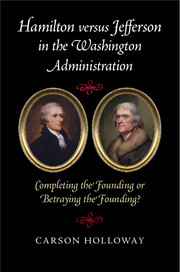 Hamilton versus Jefferson in the Washington Administration
Hamilton versus Jefferson in the Washington Administration Book contents
- Frontmatter
- Dedication
- Contents
- Acknowledgments
- 1 Introduction
- PART I A DEBATE BETWEEN CABINET COLLEAGUES
- PART II A CLASH OF RIVAL PARTY LEADERS
- 7 Securing American Independence: Hamilton's Report on Manufactures
- 8 The Revolution, Alienation of Territory, and the Apportionment Bill
- 9 Aiming for Monarchy: Jefferson's Critique of Hamiltonianism
- 10 Tending toward Anarchy: Hamilton's Critique of Jeffersonianism
- PART III Founding Foreign Policy
- Index
8 - The Revolution, Alienation of Territory, and the Apportionment Bill
from PART II - A CLASH OF RIVAL PARTY LEADERS
Published online by Cambridge University Press: 05 November 2015
- Frontmatter
- Dedication
- Contents
- Acknowledgments
- 1 Introduction
- PART I A DEBATE BETWEEN CABINET COLLEAGUES
- PART II A CLASH OF RIVAL PARTY LEADERS
- 7 Securing American Independence: Hamilton's Report on Manufactures
- 8 The Revolution, Alienation of Territory, and the Apportionment Bill
- 9 Aiming for Monarchy: Jefferson's Critique of Hamiltonianism
- 10 Tending toward Anarchy: Hamilton's Critique of Jeffersonianism
- PART III Founding Foreign Policy
- Index
Summary
In 1792, Jefferson and Hamilton had a complete break over domestic policy. By summer, Jefferson had written to Washington with an extensive critique of Hamilton's program, which Jefferson believed to be unconstitutional and anti-republican in character. In response, Hamilton defended himself and his system and mounted his own counter-critique of Jefferson, which he made both in letters to Washington and in the public newspapers.
Before turning to this momentous debate, however, it is worthwhile to examine two relatively minor arguments of early 1792, both of which help to illustrate the divergent tendencies of Hamilton and Jefferson's political and constitutional thought. The first of these took place in relation to a report on the instructions to America's ministers to Spain, which Jefferson had prepared and then showed to Hamilton, seeking the latter's advice. Hamilton submitted his thoughts to Jefferson in writing, and Jefferson in turn wrote out his own responses to Hamilton's remarks. As a result, we have a record of an exchange between the two men on the proper understanding of the American Revolution and of the scope of the powers of the federal government.
Hamilton opened with praise for Jefferson's report, the “general tenor” of which he found to be “solid and proper.” His very next comment, however, called into question the way in which the report presented the American Revolution. According to Jefferson's draft, America had been “oblig[ed]” by “circumstances” to “discontinue” its “foreign magistrate” and in his place name new ones “within every state.” This move had in turn “brought on us a war on the part of the former magistrate, supported by the nation among whom he resided.” Hamilton disputed whether it put “our Revolution upon the true or the best footing” to say that our decision to discontinue the king had brought the war. Was it not rather the case that the “war” had existed “previously” and had in fact brought on this “discontinuance”? Was not the war “rather the cause than the effect?”
Jefferson seems on second thought to have agreed with Hamilton: he noted that the report was “amended in conformity with this observation.” Nevertheless, one may fairly say that this exchange illustrates two markedly different tendencies of thought regarding the Revolution.
- Type
- Chapter
- Information
- Hamilton versus Jefferson in the Washington AdministrationCompleting the Founding or Betraying the Founding?, pp. 138 - 147Publisher: Cambridge University PressPrint publication year: 2015


